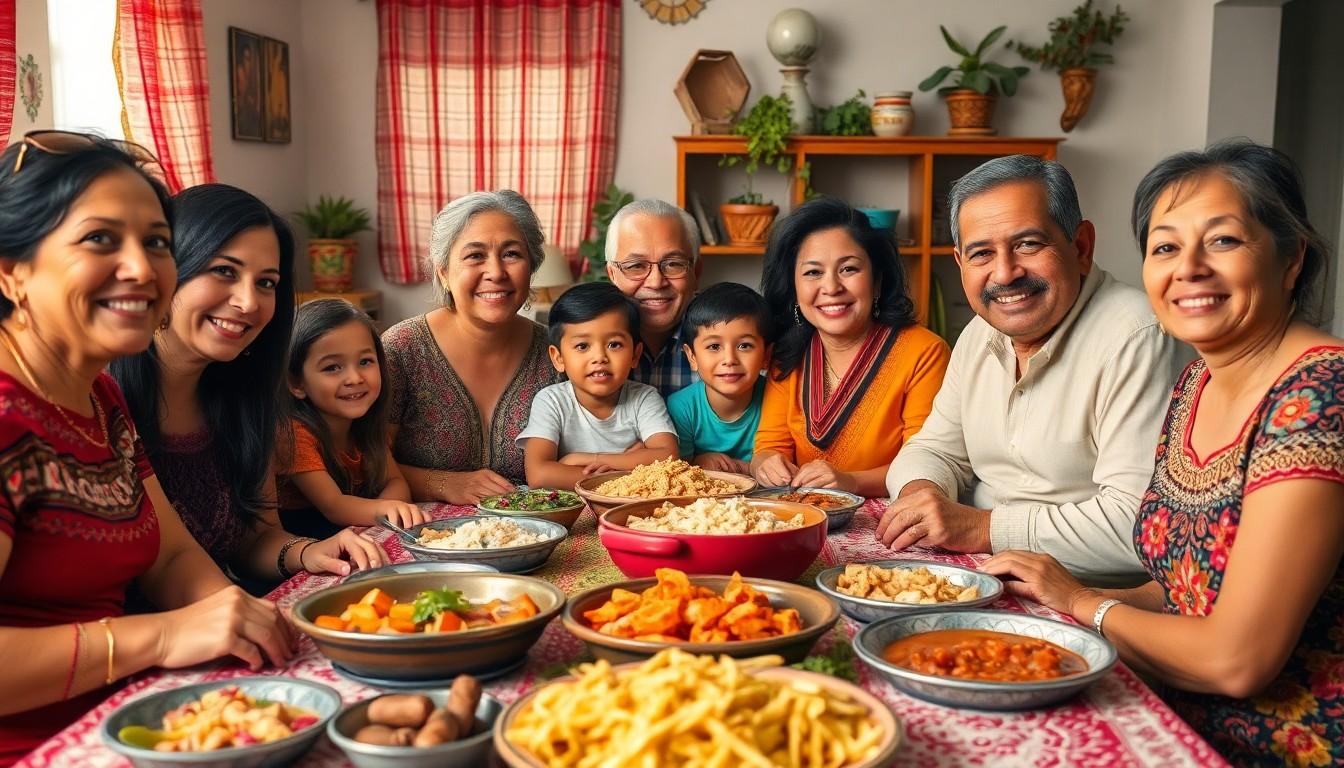When it comes to family traditions in Mexico, prepare for a vibrant fiesta of customs that’ll make you want to grab a sombrero and join in. From lively celebrations to mouthwatering feasts, every family has its unique way of honoring their heritage. It’s not just about the food—though trust us, the tacos alone are worth the trip.
Table of Contents
ToggleOverview of Family Traditions in Mexico
Family traditions in Mexico reflect deep-rooted cultural values and diverse regional influences. Celebrations such as Día de los Muertos honor ancestors, showcasing altars decorated with photos, candles, and favorite foods. Many families gather to reminisce about loved ones, reinforcing connections across generations.
Christmas festivities feature unique customs, including the posadas, which commemorate Mary and Joseph’s journey to Bethlehem. Participants reenact this journey, singing carols and sharing food. Celebrating with piñatas adds a playful element, highlighting joy and community spirit.
Family gatherings often focus on culinary traditions. Preparing and sharing traditional dishes, like tamales and mole, brings families together during holidays. These meals represent regional flavors, making each gathering distinct.
Another important tradition is Quinceañera, a rite of passage marking a girl’s 15th birthday. This celebration blends religious and social customs, featuring a church ceremony and grand party. Families invest significant time and resources to ensure an unforgettable experience.
In many households, families practice values such as respect, loyalty, and love. Children learn the importance of family through stories passed down from grandparents. Strong family ties foster a sense of belonging that echoes through each generation.
Cultural roles in Mexican families tend to emphasize cooperation and support. Extended families often live in proximity, enhancing daily interactions. This closeness cultivates traditions that adapt but remain strong amid changing times.
Significance of Family in Mexican Culture

Family forms the backbone of Mexican culture, deeply influencing values, traditions, and social structures. Relationships extend beyond the nuclear family, fostering close connections among extended family members.
Nuclear and Extended Family Structures
Nuclear families play a vital role in daily life, consisting of parents and children. In contrast, extended families often include grandparents, aunts, uncles, and cousins, creating a rich support network. Shared living arrangements commonly occur, emphasizing cooperation and collaboration. This interconnectedness strengthens ties, allowing families to overcome challenges together. Cultural celebrations typically see the participation of both nuclear and extended family members, reinforcing the significance of community.
Roles and Responsibilities within Families
Distinct roles exist within Mexican families, shaping responsibilities and expectations. Mothers often assume the role of caregivers, managing household tasks and nurturing family bonds. Fathers typically provide financial support, contributing to the family’s well-being. Children learn respect and loyalty through their involvement in family activities, aiding in household chores and celebrations. Elders are revered, their wisdom guiding the younger generations. These roles cultivate a sense of unity, ensuring that family traditions thrive across generations.
Common Family Traditions in Mexico
Family traditions in Mexico showcase a colorful tapestry of customs that enhance familial bonds. Each celebration embodies cultural heritage and shared values.
Celebrations and Holidays
Día de los Muertos honors ancestors with intricate altars. Families decorate these altars using photos, candles, and favorite foods, celebrating life and death. Christmas often involves the posadas, where families reenact Mary and Joseph’s journey. Carols fill the air as gatherings unite communities. New Year’s festivities frequently include fireworks and family feasts, welcoming the upcoming year with joy.
Daily Family Practices
Daily interactions emphasize respect and cooperation. Families often share mealtime, strengthening their connections through conversation. Shared responsibilities, such as household chores, ensure everyone participates in family life. Traditional games and storytelling promote fun while instilling values in children. Regular visits to elder relatives enhance family bonds, showcasing the importance of wisdom in daily routines.
Meals and Food Customs
Meals create a sense of unity among family members. Dishes like tamales often symbolize regional flavors and play a central role in gatherings. Families commonly prepare meals together, fostering collaboration and passing down culinary skills. Celebrations regularly feature traditional food, reinforcing cultural identity. Sharing recipes among generations preserves cherished culinary traditions, connecting families through taste and history.
Influence of Religion on Family Traditions
Religion significantly shapes family traditions in Mexico, influencing customs and celebrations. Catholicism plays a central role, embedding deep spirituality into family rituals and practices.
Catholicism and Family Rituals
Catholicism strongly resonates within Mexican family life, guiding numerous traditions. Major events like baptisms, first communions, and confirmations serve as important milestones for children, often celebrated with family gatherings and feasts. Families create altars to honor saints, particularly during significant religious holidays. The Day of the Dead illustrates this connection, as families honor deceased loved ones with offerings and prayers. Mass attendance during important dates reinforces community ties and shared beliefs. Families frequently gather for prayer and reflection, emphasizing the spiritual dimension of their everyday lives.
Other Religious Practices
Besides Catholicism, various indigenous beliefs integrate into family traditions, enriching cultural heritage. Rituals honoring earth, ancestors, and natural elements reflect deep respect for nature. Ceremonies, such as the breaking of bread during special occasions, signify unity amongst family members. The celebration of significant life events often incorporates traditional spiritual practices, showcasing the diversity within family customs. Families might practice cleansing rituals during illnesses, illustrating a blend of faith and tradition. Overall, these religious influences contribute a unique layer to the vibrant tapestry of Mexican family life.
Modern Changes in Family Traditions
Modern influences are reshaping family traditions in Mexico, introducing new dynamics while preserving essential cultural elements.
Influence of Globalization
Globalization impacts Mexican family traditions through increased communication and technology access. Families often blend traditional customs with contemporary practices, adapting to changing lifestyles. Exposure to global celebrations results in the incorporation of international holidays, such as Halloween. Younger generations tend to celebrate these events alongside traditional Mexican festivities, creating unique hybrid experiences. This fusion reflects a broader cultural exchange that enriches rather than diminishes heritage. Embracing modern technology also allows families to stay connected despite geographical distances, facilitating communication through social media and video calls. As a result, traditional practices and values continue to evolve, striking a balance between preserving their roots and embracing innovation.
Preservation of Cultural Heritage
Preserving cultural heritage remains vital for many Mexican families amidst modernization. Special efforts focus on maintaining traditional cooking methods, such as making tortillas from scratch. Families often gather to share recipes, ensuring that culinary arts thrive across generations. Craftsmanship, such as weaving and pottery, endures as families pass down these skills, supporting local artisans and cultural identity. Educational programs increasingly emphasize the importance of regional customs, enabling children to learn about their heritage. Cultural festivals serve as platforms for showcasing traditional performances, reinforcing community bonds. Such initiatives highlight commitment to sustaining the essence of Mexican culture while adapting to modern realities.
Family traditions in Mexico embody a vibrant tapestry of cultural values and regional influences. These practices not only celebrate heritage but also strengthen familial bonds through shared experiences. The blending of traditional customs with modern influences showcases the adaptability of these traditions while ensuring their preservation.
As families continue to gather for festive occasions and daily rituals, they reinforce the importance of respect and cooperation. The enduring significance of these traditions highlights the central role family plays in Mexican society. Ultimately, the commitment to honoring the past while embracing the future ensures that the spirit of Mexican family life remains alive and thriving.


